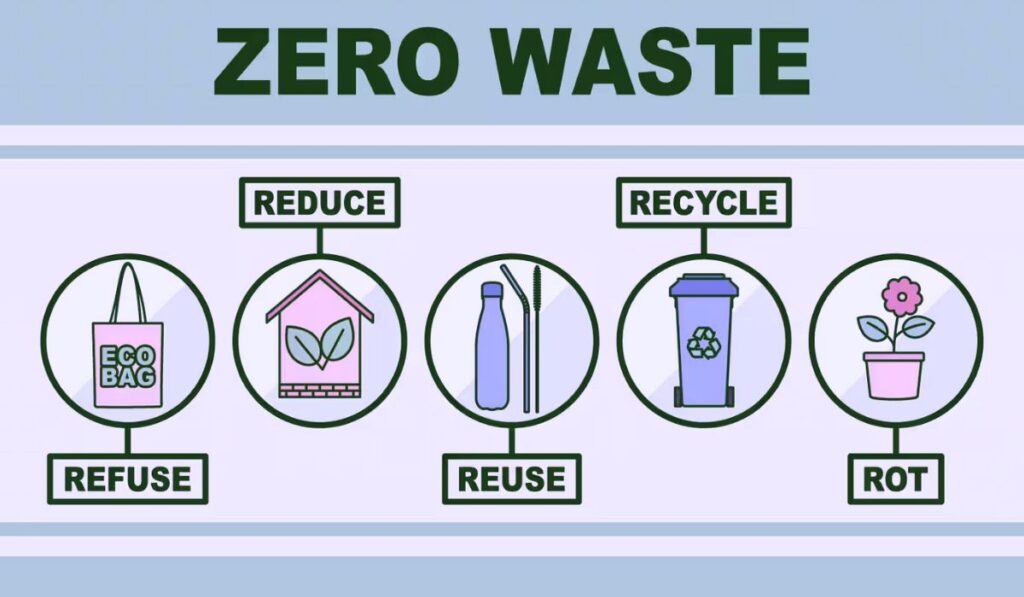In the face of escalating environmental concerns and the imperative to foster sustainable practices, the concept of zero waste has emerged as a beacon of hope. Championed by individuals, communities, and corporations alike, the ethos of zero waste represents a paradigm shift in our approach to resource management. Gone are the days of heedless consumption and reckless disposal; instead, we are ushering in an era of conscientious stewardship and innovative solutions. This article explores the multifaceted dimensions of the zero waste movement and delves into the strategies reshaping our relationship with resources.
Understanding Zero Waste
At its core, zero waste is a philosophy that aims to eliminate waste generation and maximize resource efficiency. Contrary to popular belief, achieving zero waste does not entail eradicating all waste entirely. Rather, it involves reimagining waste as a valuable resource that can be repurposed, recycled, or composted. By adopting a holistic approach encompassing production, consumption, and disposal, zero waste endeavors to create a closed-loop system where materials are continuously cycled back into the economy.
Rethinking Resource Management
Central to the zero waste ethos is the recognition that traditional linear models of resource management are inherently unsustainable. The linear “take-make-dispose” paradigm perpetuates a cycle of depletion and pollution, exacerbating environmental degradation and depleting finite resources. In contrast, zero waste advocates for a circular economy model wherein resources are conserved, reused, and regenerated. By prioritizing strategies such as waste reduction, product redesign, and material recovery, businesses and communities can minimize their ecological footprint while unlocking economic opportunities.
Key Strategies for Zero Waste
Embracing zero waste entails a multifaceted approach that encompasses various strategies and initiatives. These may include:
- Source Reduction: Reducing waste at the source by minimizing packaging, opting for reusable alternatives, and embracing minimalist consumption habits.
- Recycling and Upcycling: Implementing robust recycling programs to divert materials from landfills and promoting the upcycling of discarded items into new products.
- Composting: Harnessing the power of organic waste through composting, thereby enriching soil health and closing the nutrient loop.
- Extended Producer Responsibility (EPR): Holding producers accountable for the lifecycle impacts of their products, incentivizing eco-design and end-of-life management.
- Community Engagement: Fostering grassroots movements and community initiatives to raise awareness, drive behavioral change, and promote collective action towards zero waste goals.
The Role of Technology and Innovation
In the pursuit of zero waste, technology and innovation play pivotal roles in catalyzing systemic change. From advanced recycling technologies to blockchain-enabled supply chain transparency, emerging innovations offer novel solutions to complex waste management challenges. Additionally, digital platforms and data analytics empower stakeholders to optimize resource flows, track waste streams, and identify opportunities for efficiency gains. By harnessing the transformative potential of technology, we can accelerate progress towards a zero waste future.
Challenges and Opportunities
While the vision of zero waste is undeniably compelling, its realization is not without challenges. Obstacles such as infrastructure limitations, regulatory barriers, and cultural inertia pose formidable hurdles on the path to sustainability. However, these challenges also present opportunities for collaboration, innovation, and collective problem-solving. By fostering partnerships between governments, businesses, and civil society, we can overcome barriers and forge a path towards a regenerative, waste-free future.
Conclusion
In conclusion, the transition towards zero waste represents a fundamental reimagining of our relationship with resources and the environment. By embracing principles of circularity, resource efficiency, and innovation, we can chart a course towards a more sustainable and prosperous future. While the journey ahead may be fraught with challenges, the imperative to act has never been clearer. Together, let us seize the opportunity to redefine resource management and build a world where waste is not an end but a new beginning.


